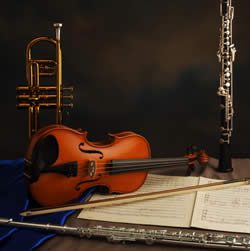This blog post was written by Laura Kexel, a music teacher in the Kent School District, for our edCored series on education funding. If you want to be notified when new content is published in this month-long series, please subscribe to the LEV Blog’s RSS feed or once-a-day email digest.
 I am an itinerant orchestra teacher. I am currently assigned to eight elementary schools teaching sixth grade beginning orchestra. When I was hired in 2007, I was assigned to five elementary schools teaching fifth and sixth grade orchestra. Every year that I have taught in the Kent School District, not only have elementary band and orchestra been on the chopping block, but the district has threatened to cut all elementary music to save money. Last year, fifth graders lost the chance to start in band and orchestra. The district is desperate for money, and our children are suffering.
I am an itinerant orchestra teacher. I am currently assigned to eight elementary schools teaching sixth grade beginning orchestra. When I was hired in 2007, I was assigned to five elementary schools teaching fifth and sixth grade orchestra. Every year that I have taught in the Kent School District, not only have elementary band and orchestra been on the chopping block, but the district has threatened to cut all elementary music to save money. Last year, fifth graders lost the chance to start in band and orchestra. The district is desperate for money, and our children are suffering.
I have a Masters Degree in Teaching, yet I spend only three hours a day in contact with students. I make enough money on mileage checks to pay three car payments in a school year.
 Besides having to fight every year just to keep music alive in elementary schools, we have suffered some pretty devastating cuts. The district owns hundreds of band and orchestra instruments but has cut the repair and maintenance budget to ZERO. Would you buy a house and then never mow the lawn, vacuum, paint, etc.? They have a set maintenance fee for students to rent those instruments – $80 – but if a student has free or reduced lunch, the fee is reduced down, often to a mere $20. This $20 buys two strings (almost) or 1/2 of a new bow or 1/3 of a new case or almost none of a repair when needed for normal wear and tear issues.
Besides having to fight every year just to keep music alive in elementary schools, we have suffered some pretty devastating cuts. The district owns hundreds of band and orchestra instruments but has cut the repair and maintenance budget to ZERO. Would you buy a house and then never mow the lawn, vacuum, paint, etc.? They have a set maintenance fee for students to rent those instruments – $80 – but if a student has free or reduced lunch, the fee is reduced down, often to a mere $20. This $20 buys two strings (almost) or 1/2 of a new bow or 1/3 of a new case or almost none of a repair when needed for normal wear and tear issues.
Itinerant band and orchestra teachers used to get an allotment to spend on new music. Unlike math or science, we don’t have a set of textbooks that the district purchases and adopts every five to 10 years. Our books are purchased by the students themselves, and music is our textbook. We have to share that music, and now that we only teach beginning orchestra and band, we can’t use a great deal of what we have because it is beyond the skill level of the students. Our allotment was reduced to ZERO last year and has stayed the same. No new music, despite the changing needs of our students. Are we supposed to write the music ourselves?
Every school principal has warned against making too many copies. Again, I don’t have a textbook curriculum. Everything I do is from a photocopy. I don’t always have time at every school to make copies for just that school, so sometimes I have to make all the copies I need for the week in one place. I try to spread that around evenly, but I’m not always successful. My schedule doesn’t allow me to be. I sincerely hope that I make it to the end of the year without getting cut off.
There are many more ways that budget cuts affect us and our students, but I have to stop here before I let all this wash over me. I need to keep positive despite the tough road ahead, and I can’t do that when I dwell on all the bad news. The bottom line is that I teach whoever shows up in my class, whatever their needs. I spend my weekends calling parents to make sure every student has an instrument. I make extra trips on my own time to the district warehouse and music stores to get supplies. I do all of this because someone has to do it, and it is important. I want what is best for my students, and I will do what is necessary to make that happen.
3 comments on “edCored: The day the music died”
Laura, thank you for sharing this. It is important. I can feel both your passion and pain in this description of how you fight to stem the tide of cuts that are eliminating the arts – a core subject and part of the state definition of basic ed.
Part of the problem is that the active and impassioned voices of our communties are not being raised. When we don’t show up expressing our outrage that the cuts are disproportionately impacting arts classes and that the arts are effectively being put off limits for a whole segment of our children, we tacitly concur with this choice. We can’t leave it to the teachers to resist within the system. Every single arts teacher I know does the same as Laura, spending their own money, committing so much time beyond the school day.
Let’s all stand up and speak out about what our kids need. And they need the arts as part of a complete education – it helps them stay engaged, learn multiple ways of communication, develop competencies for success in the 21st century – in addition to the learning in the art form. When we fail to show up, we send an equally strong message to our schools and districts.
Oh, and by the way – it’s not too late to find out where your school board candidates stand on equitable provision of the arts. ArtsEd Washington developed a candidate’s survey which Seattle Arts Commission just sent out today and we’ll be posting the template for the survey on our website very soon so other communities can use it.
Come on everybody – Ask your candidates what they’re going to do to ensure the arts are provided to all students fairly and sequentially! Thanks, LEV for raising this issue.
I’m a KSD parent and thank you for sharing your story. Your words matter and will make a difference. A lot of people just don’t know how bad it is. With elementary aged kids, I knew some of this but not most. Thank you.
Jennifer,
I teach general music in the KSD. Last spring, the school board said that they heard the parents when they said “no more cuts in music”. Unfortunately, administrators have not. Despite the board’s position, music in the district is being cut at the building level. The Kent School District was once a model of excellence in music within the state. Now, those of us dedicated to providing arts education to all students in Kent are being squeezed to the point of despair. Whatever you can do to mobilize your parent friends and their friends is the only way we see even the status quo remaining. It is certainly the only way to restoration of an education that teaches the whole child.